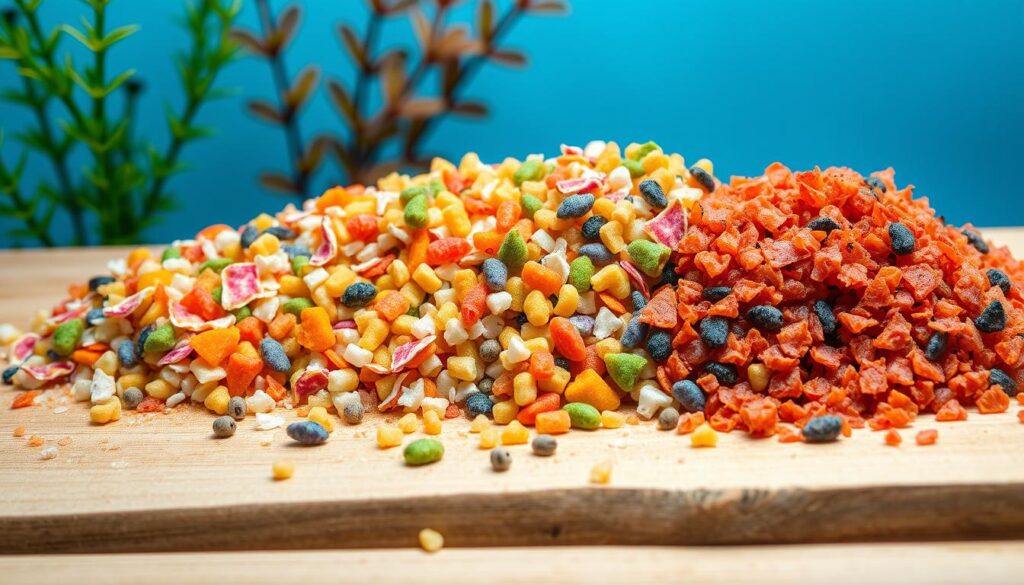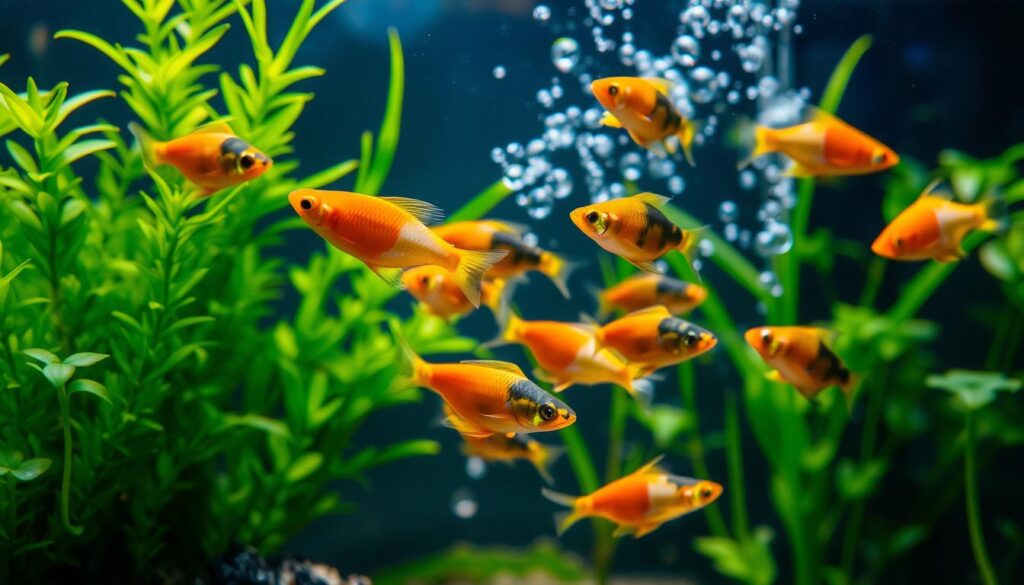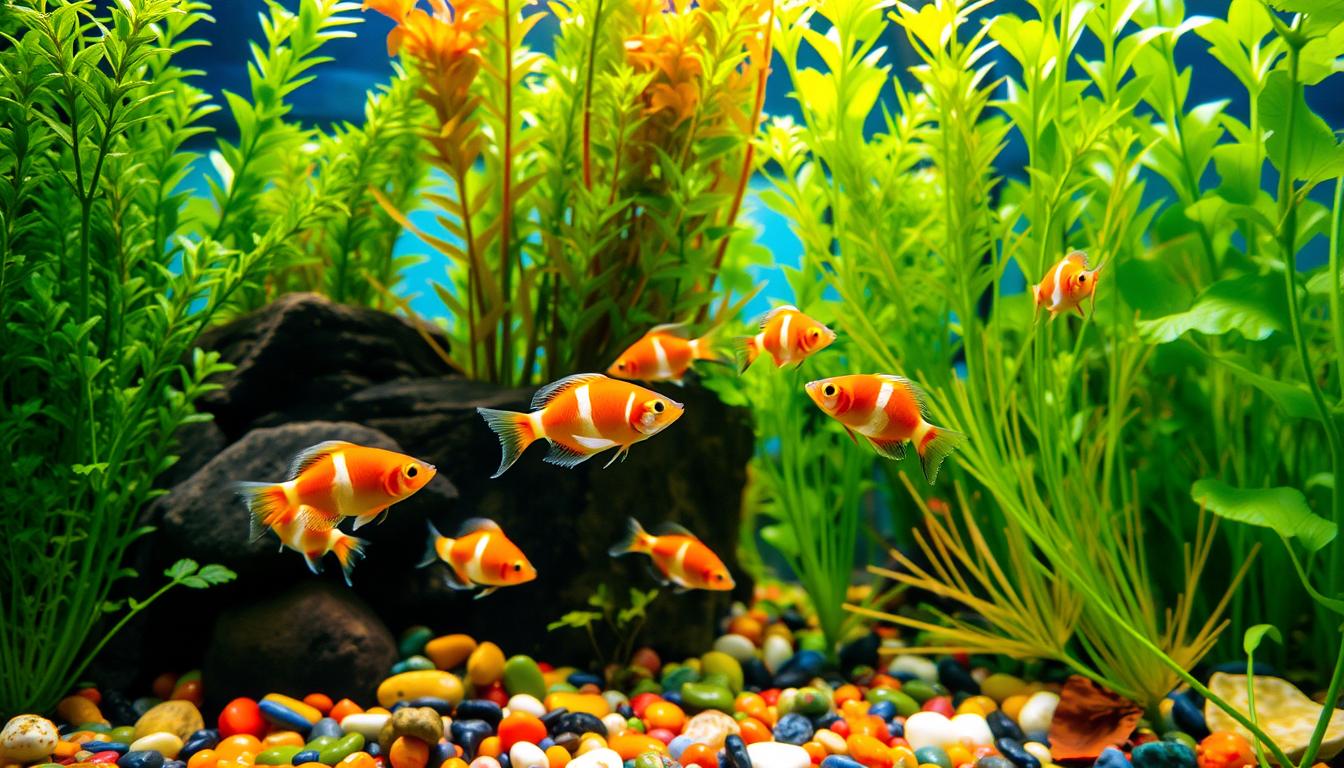Thinking of adding some lively fish to your home aquarium? Danio fish are a great choice. They are hardy and easy to care for, making them perfect for beginners. Let’s explore why danio fish are so charming and easy to look after.
Danio fish belong to the Cyprinidae family. They are known for their energetic nature and beautiful patterns. These small fish do well in cooler water, which is perfect for unheated tanks in warm rooms. Their attractive looks and ability to live with other small fish make them ideal for community aquariums.
Table of Contents
Understanding Danio Fish Species and Origins
Danio fish, also known as zebrafish, come from the northern parts of the Indian subcontinent. They are small freshwater fish and belong to the Danio genus. This genus has nearly 30 different species. The most famous is the Brachydanio rerio, or zebra danio.
Other Danio species are also popular in aquariums. They are known for their beauty and lively nature.
Native Habitat and Natural Behavior
Danio fish live in slow-moving ponds, streams, and rice paddies in eastern India, Pakistan, and other places. They love areas with lots of plants. Here, they forage, school, and spawn.
These fish are very active and social. They make great dither fish, helping calm other tank mates.
Common Danio Varieties in the Aquarium Trade
- Zebra Danio (Brachydanio rerio) – The most popular Danio species, reaching 2-2.5 inches in length, with distinctive black or dark blue horizontal stripes.
- Long-Finned Danio – A variant of the zebra danio with elongated fins for a more decorative appearance.
- Albino Danio – A mutation of the zebra danio with a pale, translucent body and pink eyes.
- GloFish Danio – A genetically modified zebra danio with fluorescent colors, created by introducing a fluorescent protein gene.
- Leopard Danio – Showcases a light yellow body with irregular blue-black spots, found in slow-moving waters.
Physical Characteristics and Size
Danio fish are small, ranging from 1.5 to 4 inches in length. The zebrafish, the most common, grows to 2-2.5 inches. They have a slim body and bright colors, making them beautiful in aquariums.
Why Danios Make Perfect Starter Fish
If you’re new to aquariums and want easy-to-care-for fish, danios are a great pick. These fish are active, colorful, and easy to care for. They’re perfect for your first tank.
Danios are very hardy. They can handle different water conditions well. They like pH levels from 6.0 to 8.0 and water hardness from soft to moderately hard. This means they can live in many types of tanks, making them easy for beginners to care for.
- Danios are highly adaptable to different water conditions.
- They can tolerate a pH range of 6.0 to 8.0 and water hardness levels from soft to moderately hard.
- Their active nature and striking appearance make them an attractive addition to community tanks.
- Danios are relatively inexpensive and widely available in the aquarium trade.
Danios are also very active and colorful. They swim together in groups, making your tank look amazing. Their lively behavior and bright colors are a hit with both new and experienced fish keepers.
Plus, danios are easy on the wallet and easy to find. They’re a great choice for beginners because they’re hardy, adaptable, and affordable. Danios are perfect for those starting their aquarium journey.
| Minimum Tank Size | Maximum Size | Temperature Range | pH Range | Water Hardness |
|---|---|---|---|---|
| 20 gallons (75 liters) | 2.5 inches | 64 – 74°F (18 – 23.5°C) | 6.5 – 7.0 | 5 – 12 dGH |
Danios are a fantastic choice for beginners. They’re hardy, adaptable, and beautiful. They’re perfect for your first tank.
Setting Up Your Danio Aquarium
Setting up a freshwater tank for danio fish involves several key steps. These include choosing the right tank size, ensuring the water parameters are correct, and selecting essential equipment. Let’s explore these details to help you set up a successful aquarium setup.
Tank Size Requirements
Danios are active and need plenty of space to swim. A 20-gallon long aquarium or bigger is the minimum size recommended. This size allows them to swim freely and exhibit their natural behaviors. Since they do best in groups of 5 to 6, make sure your tank is large enough for them.
Water Parameters and Temperature
Danios are easy to care for, making them great for beginners. They prefer a temperature between 65-75°F (18-24°C). They can even live in tanks without heaters. The best pH for them is slightly acidic, between 6.5 to 7.0, with a water hardness of 5-12 dGH.
Essential Equipment Checklist
- Gentle sponge filter to keep the water clean
- Aquarium plants and hiding spots for cover and enrichment
- Open swimming areas to allow for natural schooling behavior
By setting up the right aquarium setup and environment, you can create a great home for your danio fish. This will help them thrive and show off their vibrant colors and unique personalities.
Creating the Ideal Tank Environment
To make your zebra danios happy, you need to create a great tank environment. These fish love living in tanks that feel like their home in India and Nepal. Adding the right aquarium decor and planted tank elements helps a lot.
First, pick a tank that’s big enough for them. Zebra danios need at least 5 gallons, but 10 gallons is better. This size lets them swim and school well. Use a substrate like fine gravel or sand that’s easy to keep clean.
- Make sure the water flows gently, like their natural habitats.
- Use live plants and aquarium decor like driftwood and rocks. This makes the tank look good and keeps your danios safe.
- Keep the water just right for them: pH 6.5-7.2, soft to medium hard, and 65-77°F (18-25°C).
With a well-designed planted tank, your zebra danios will be happy and healthy. Plus, you’ll get to enjoy a beautiful aquarium.
| Zebra Danio Tank Requirements | Ideal Specifications |
|---|---|
| Minimum Tank Size | 5 Gallons (10 Gallons Recommended) |
| Maximum Size | 2.5 inches (6 cm) |
| Water pH | 6.5-7.2 |
| Water Hardness | Soft to Medium |
| Water Temperature | 65-77°F (18-25°C) |
| Minimum School Size | 6 Danios |
Danio Fish Care and Maintenance
Proper care and regular maintenance are key to keeping your Danio fish healthy. By sticking to a routine, you create a clean, stable home for them. This environment meets their needs perfectly.
Daily and Weekly Care Routine
Begin each day by feeding your Danios a balanced diet. Make sure they eat it all within a few minutes to avoid overfeeding. Watch them closely for any signs of stress or illness.
Also, do a partial water change of 10-20% weekly. This keeps the water quality high and prevents harmful toxins from building up.
Water Change Schedule
Testing your aquarium’s water regularly and changing it is vital for your Danio’s health. Try to change 10-20% of the water weekly. Use treated, temperature-matched water to refill the tank.
This helps control nitrate, nitrite, and ammonia levels. It keeps your Danios’ environment healthy.
Health Monitoring Tips
Watch your Danio fish closely. Look for signs of stress like erratic swimming, loss of appetite, or color changes. If you notice any issues, test the water and treat it as needed.
Remember, consistent fish care and aquarium maintenance are crucial. By following this routine, you’ll ensure your Danio fish live happily in your home aquarium.
Feeding Your Danios: Diet and Nutrition
Feeding your danio fish right is key. In the wild, they eat small crustaceans, insects, worms, and microorganisms. In your tank, they like fish flakes, nano pellets, freeze-dried foods, frozen bloodworms, and live baby brine shrimp.
It’s vital to give your danios a varied fish food and aquarium diet. This keeps them healthy and colorful. It also makes sure all fish in your tank get the nutrients they need.
- Zebra danios typically reach a length of about 2-2.5 inches (5-6 cm) depending on the variety.
- Leopard danios, a color variation of zebra danios, exhibit a light gold body covered in dark dots.
- It is recommended to keep at least 5-6 zebra danios in a school to prevent fin nipping behavior.
- Zebra danios can release 100 or more eggs per spawning event.
Feed your danios a mix of live and frozen foods. This gives them a balanced diet and keeps them active. With the right food and care, your danios will do great in their tank.

Social Behavior and Compatible Tank Mates
Danio fish, like the Zebra Danio, love to be in groups. They do best with 5-6 of their own kind. This makes them happy and healthy in a community tank.
Schooling Requirements
Danios are very social and need to be in groups. Keeping 5-6 danios together helps them feel safe and active. It’s key for their well-being.
Best Compatible Tank Mates
Danios get along well with peaceful, active fish of similar size. Good tank mates include:
- Rainbowfish
- Livebearers (such as guppies and swordtails)
- Barbs
- Loaches
Stay away from slow-moving or long-finned fish. Danios might stress or nip at their fins. Also, keep danios away from big, aggressive fish for their safety.
| Fish Species | Max Size | Ideal Tank Size | Compatibility with Danios |
|---|---|---|---|
| Zebra Danio | 2.5 inches | 10 gallons | Excellent |
| Cory Catfish | 2 inches | 10 gallons | Good |
| Kuhli Loach | 5 inches | 10 gallons | Good |
| Swordtail | 6 inches | 20 gallons | Good |
| Cardinal Tetra | 1.5 inches | 20 gallons | Excellent |
| Angelfish | 6 inches | 30 gallons | Good |
Choosing the right compatible tank mates helps create a happy community tank. Danio fish will be the star of the show.
Breeding Danios Successfully
If you love fish, breeding danio strains can be very rewarding. Danios, like the Zebra Danios, are easy to care for. They make great choices for breeding at home.
To help fish breeding, keep the water just right. Zebra Danios like water that’s a bit acidic to neutral. The temperature should be between 78°F and 82°F. A 10-gallon tank is a good size for them to spawn and grow.
As Zebra Danio fry grow, their food changes. They start with tiny foods like infusoria and liquid fry food. Then, they move to brine shrimp and small flakes. Having more females than males, like 2:1, helps with breeding.
Creating a safe place for eggs is key. Use plants or spawning mops to protect them. After the eggs are laid, take out the adult fish to keep them safe.
- Keep the water right: pH 6.5-7.0, hardness 5-12 dGH, and temperature 78-82°F.
- Make sure your tank is at least 10 gallons for Zebra Danios.
- Feed fry a mix of foods, starting with tiny foods and then brine shrimp and flakes.
- Have more females than males, like 2:1, to help with breeding.
- Use plants or spawning mops to protect eggs and remove adults after spawning.
By following these tips and watching closely, you can raise healthy danio strains at home.

Common Health Issues and Prevention
Danio fish are delightful, but it’s important to watch them for illness signs. Changes in behavior, appetite, or appearance can signal health problems. Being quick to spot and treat diseases is key to keeping your fish healthy.
Disease Recognition
Danios can get sick with ich (white spot disease), fin rot, and bacterial infections. Ich causes white spots on their skin and fins. Fin rot makes their fins fall apart due to bad water or bacteria.
Bacterial infections, like Aeromonas, can cause skin ulcers and swelling. It’s vital to watch your danios closely and act fast. Keeping new fish in quarantine and good water quality can prevent diseases.
Treatment Options
If your danios seem sick, treat them quickly. The right treatment depends on the disease. For example, ich needs special remedies, while bacterial infections might need antibiotics.
Keeping their environment clean and well-oxygenated is crucial. Regular water changes, vacuuming, and good filtration help prevent and manage diseases.
| Common Fish Health Issue | Symptoms | Potential Causes | Treatment Options |
|---|---|---|---|
| Ich (White Spot Disease) | Tiny white spots on the skin and fins | Protozoan parasite Ichthyophthirius multifiliis | Commercially available ich treatments, salt, and temperature adjustments |
| Fin Rot | Frayed, discolored, or deteriorating fins and tails | Bacterial infection, poor water quality | Antibacterial medications, water changes, and improved water parameters |
| Bacterial Infections | Skin ulcers, swelling, discoloration | Aeromonas, Pseudomonas, and other bacteria | Antibacterial medications, water quality improvement |
Conclusion
Danio fish are great for both new and seasoned fish keepers. They are hardy, colorful, and fun to watch. They make perfect additions to community tanks. With the right care, they can brighten your home for years.
Starting or growing your aquarium hobby with danios is rewarding. They are active, colorful, and fun to watch. They add excitement to your aquarium, making it lively.
Let danio fish bring joy to your home. They are easy to care for and add beauty to your aquarium. With some knowledge and effort, you can enjoy their charm for a long time.


1 thought on “Danio Fish: Perfect Beginner-Friendly Aquarium Pets”